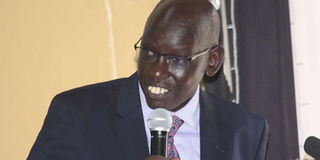Parents sue Education ministry over reduced school funds

Education Principal Secretary Belio Kipsang addresses participants during the launch of the National Curriculum Policy at Kenya Institute of Curriculum Development, in Nairobi, on May 15, 2019. The ministry will stand by its decision to buy textbooks directly from publishers to save costs. PHOTO | FILE | NATION MEDIA GROUP
What you need to know:
- The government, in an October 19, 2017 circular, took up the responsibility of providing free secondary education in conformity with the 2013 Basic Education Act.
The Ministry of Education has been sued for withholding hundreds of millions of shillings meant for secondary schools.
Two parents want the court to compel the ministry to explain why money meant for infrastructure, extra curricula activities and learning materials is never released to day schools.
Mr Daniel Ndung’u and Ms Evelyn Muthoni filed the case at the High Court, accusing the ministry of withholding at least Sh8,000 of the Sh22,244 allocated to every learner in high school.
Through their lawyer Peter Raydon, the two say they were aggrieved by communication from the Education Cabinet Secretary, through his Principal Secretary, giving new guidelines on the implementation of Free Secondary Education (FSE).
The pair accuses the ministry of unjustifiably disrupting the running of schools through the deductions.
OVERSTEPPING
The petitioners say the government through an October 25, 2018 circular took it upon itself to make deductions of Sh6,000 meant for the maintenance and improvement of schools and retained Sh1,830 per learner to cater for the Strengthening of Mathematics and Science in Secondary Education (Smasse) programme, co-curricular activities, the purchase of text books and medical cover.
“The … deductions and retention of the money is without basis as the mandate of budgeting and utilising of the government allocated funds lies with the boards of management of schools and not the ministry,” they told the court.
The two also argue that the ministry’s budget, which is separate from the government’s allocation of FSE, cannot purport to hold the money that is intended for schools.
Mr Ndung’u said the deductions have seen public schools get only Sh12,500 per student per term.
The government, in an October 19, 2017 circular, took up the responsibility of providing free secondary education in conformity with the 2013 Basic Education Act. The Act recognises education as a basic human right.
Consequently, the ministry took up the responsibility of paying Sh22,244 per student per year beginning January 2018.
SERVICES
The money was to cater for teaching, learning materials, examinations (Sh4,792), repairs, maintenance and improvement (Sh2,886), local travel and transport (Sh1,833), administration cost (Sh1,372), electricity, water and conservancy (Sh2,131), activity fees (Sh1,256) and personal emoluments and medical insurance (Sh5,755)
The petitioners say the CS issued another circular with new policies which involved creating new vote heads and pooling others “with the intention of retaining part of the money”.
They want the court to declare the directives of the circular of restructuring the vote heads and deducting and retaining the money illegal.
The two also want orders compelling the ministry to release the amounts intended for the implementation of free secondary schooling.
The Education CS, the Basic Education PS and the Attorney-General are listed as respondents.
The ministry has defended its decision, “which is in line with its mandate of ensuring proper utilisation of financial resources in schools”.
FUNDS MISUSE
Through a July 12, 2019 affidavit sworn by Education PS Belio Kipsang, the ministry said it relied on an audit it commissioned which showed schools did not buy enough text books to realise the student text book ratio of 1:1 despite the government releasing cash for the scheme.
“To mitigate against corruption and cushion the public against loss of funds, the ministry resolved to buying textbooks directly from publishers,” Dr Kipsang said.
He added that upon revising the policy, the government realised a student-book ratio of 1:1 within a year “and made huge savings”.





